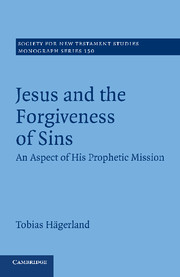Book contents
- Frontmatter
- Contents
- Tables
- Acknowledgements
- Abbreviations
- 1 Introduction
- 2 Forgiveness in the gospel tradition
- 3 Forgiveness and primitive Christian theology
- 4 Mediators of forgiveness in early Judaism
- 5 Forgiveness in the mission of the historical Jesus
- 6 Forgiveness from Jesus to the Gospels
- 7 Conclusion
- Bibliography
- Index of passages
- Index of modern authors
- Index of topics
4 - Mediators of forgiveness in early Judaism
Published online by Cambridge University Press: 05 December 2011
- Frontmatter
- Contents
- Tables
- Acknowledgements
- Abbreviations
- 1 Introduction
- 2 Forgiveness in the gospel tradition
- 3 Forgiveness and primitive Christian theology
- 4 Mediators of forgiveness in early Judaism
- 5 Forgiveness in the mission of the historical Jesus
- 6 Forgiveness from Jesus to the Gospels
- 7 Conclusion
- Bibliography
- Index of passages
- Index of modern authors
- Index of topics
Summary
At least since the 1840s, when Bauer published his insightful critique of the Gospels, scholars have been aware that Mark 2.6–7, where the omniscient narrator claims knowledge of the scribes’ unspoken criticism, can hardly be acknowledged as historical in the strict sense. Despite this recognition, it has in fact been commonly held that the scribal protest brings a first-century Jewish tenet to expression fairly well: God alone could forgive sins. Fiedler summarized the consensus approvingly in 1976: ‘Any expectation of an act of forgiving by anyone else than God himself was missing; not only that: such an activity could only be understood as an attack upon God’s own prerogative – as far as it would be taken seriously at all.’ The present chapter will challenge this statement both by re-examining the texts already mentioned in the debate, and by highlighting some passages that seem not to have received scholarly attention in this context, but which are of acute importance to the question. In addition to this assessment of the plausibility of the scribal protest, I will consider a point of almost equal consequence, namely the apparent silence of the scribes as they are faced with Jesus’ argument in 2.8–10. This feature, too, has implications for my verdict about the historicity of 2.6–10.
The criterion of implausibility, which comes into play in this chapter, has a number of limitations already discussed in Chapter 1. It assumes a reconstruction of (in this case) early Judaism, which is built on incomplete evidence that has to be generalized. Even if none of the extant sources agrees with the sentiment expressed in 2.7, as I will argue is in fact the case, the possibility that individual scribes in Capernaum held to it can never be excluded with certainty. This is a natural limitation of historiography: we do not have all the facts, so our reconstructions have to be based on the most reasonable interpretation of the facts that we do have.
- Type
- Chapter
- Information
- Jesus and the Forgiveness of SinsAn Aspect of his Prophetic Mission, pp. 132 - 178Publisher: Cambridge University PressPrint publication year: 2011
- 1
- Cited by



